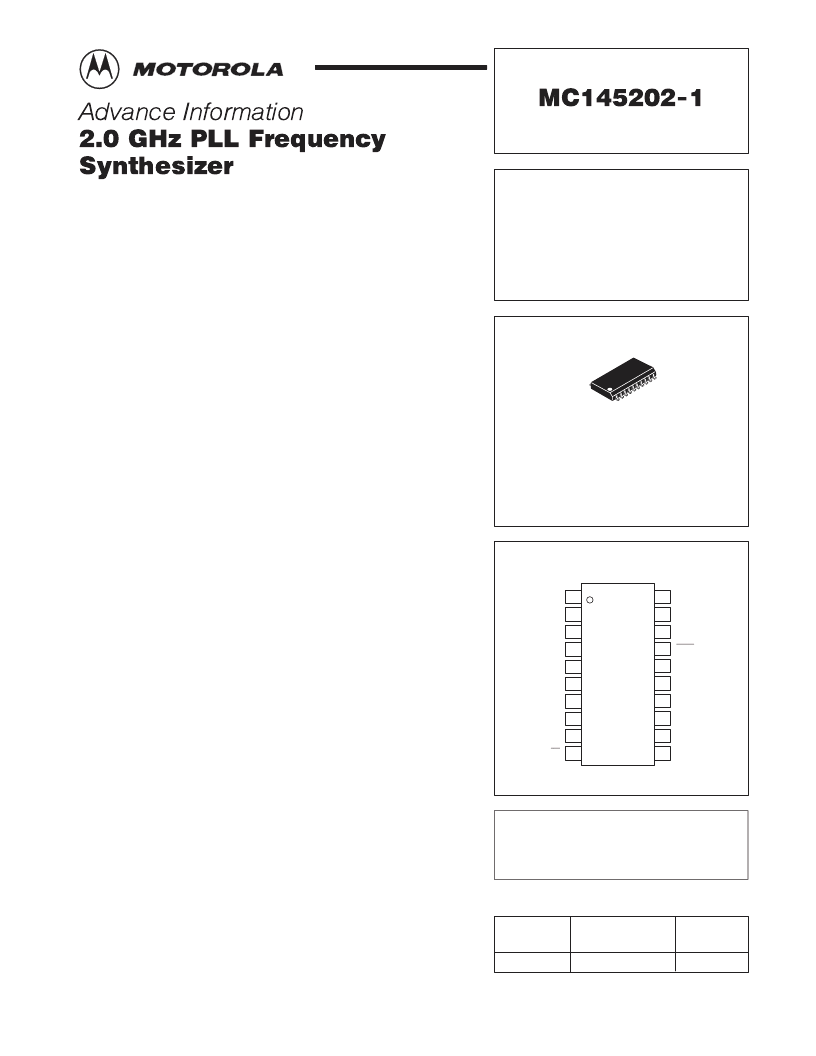- 您現(xiàn)在的位置:買賣IC網(wǎng) > PDF目錄371014 > MC145202-1 (Motorola, Inc.) PLL Frequency Synthesizer(2.0GHz PLL頻率合成器) PDF資料下載
參數(shù)資料
| 型號: | MC145202-1 |
| 廠商: | Motorola, Inc. |
| 英文描述: | PLL Frequency Synthesizer(2.0GHz PLL頻率合成器) |
| 中文描述: | 鎖相環(huán)頻率合成器(2.0GHz的鎖相環(huán)頻率合成器) |
| 文件頁數(shù): | 1/23頁 |
| 文件大小: | 270K |
| 代理商: | MC145202-1 |

Device
Operating
Temperature Range
Package
SEMICONDUCTOR
TECHNICAL DATA
PLL FREQUENCY
SYNTHESIZER
ORDERING INFORMATION
MC145202F1
TA = –40 to 85
°
C
SO–20
F SUFFIX
PLASTIC PACKAGE
CASE 751J
(SO–20)
20
1
PIN CONNECTIONS
Order this document by MC145202–1/D
1
2
3
4
5
6
7
8
9
10
20
19
18
17
16
15
14
13
(Top View)
REFout
LD
φ
R
φ
V
REFin
Din
CLK
ENB
Output A
Output B
VDD
Test 2
12
11
Test 1
VCC
fin
VPD
PDout
Gnd
Rx
fin
EVALUATION KIT
The P/N MC145202–1EVK, which contains
hardware and software, is available.
1
SOLUTIONS – RF AND IF DEVICE DATA
The MC145202–1 is pin–for–pin compatible with the previous generation
MC145200, MC145201, and MC145202. Table 1 highlights the differences in
the four devices. The MC145202–1 is recommended for new designs and
has improved suppression of reference sideband spurs.
The counters are programmed via a synchronous serial port which is SPI
compatible. The serial port is byte-oriented to facilitate control via an MCU.
Due to the innovative BitGrabber Plus
registers, the MC145202–1 may be
cascaded with other peripherals featuring BitGrabber Plus without requiring
leading dummy bits or address bits in the serial data stream. In addition,
BitGrabber Plus peripherals may be cascaded with existing BitGrabber
peripherals.
The device features a single–ended current source/sink phase detector A
output and a double–ended phase detector B output. Both phase detectors
have linear transfer functions (no dead zones). The maximum current of the
single–ended phase detector output is determined by an external resistor
tied from the Rx pin to ground. This current can be varied via the serial port.
Slew–rate control is provided by a special driver designed for the REFout
pin. This minimizes interference caused by REFout.
This part includes a differential RF input that may be operated in a
single–ended mode. Also featured are on–board support of an external
crystal and a programmable reference output. The R, A, and N counters are
fully programmable. The C register (configuration register) allows the part to
be configured to meet various applications. A patented feature allows the C
register to shut off unused outputs, thereby minimizing system noise and
interference.
In order to have consistent lock times and prevent erroneous data from
being loaded into the counters, on–board circuitry synchronizes the update
of the A register if the A or N counters are loading. Similarly, an update of the
R register is synchronized if the R counter is loading.
The double–buffered R register allows new divide ratios to be presented
to the three counters (R, A, and N) simultaneously.
Maximum Operating Frequency: 2000 MHz @ – 10 dBm
Operating Supply Current: 4 mA Nominal at 3.0 V
Operating Supply Voltage Range (VDD, VCC, VPD Pins): 2.7 to 5.5 V
Current Source/Sink Phase Detector Output:
1.7 mA @ 5.0 V or 1.0 mA @ 3.0 V
Gain of Current Source/Sink Phase/Frequency Detector Controllable via
Serial Port
R Counter Division Range: 1 and 5 to 8191
Dual–Modulus Capability Provides Total Division up to 262,143
High–Speed Serial Interface: 4 Mbps
Output A Pin, When Configured as Data Out, Permits Cascading of
Devices
Two General–Purpose Digital Outputs:
Output A: Totem–Pole (Push–Pull) with Four Output Modes
Output B: Open–Drain
Patented Power–Saving Standby Feature with Orderly Recovery for
Minimizing Lock Times, Standby Current: 30
μ
A
See App Note AN1253/D for Low–Pass Filter Design, and AN1277/D for
Offset Reference PLLs for Fine Resolution or Fast Hopping
BitGrabber and BitGrabber Plus are trademarks of Motorola, Inc.
This document contains information on a new product. Specifications and information herein
are subject to change without notice.
Motorola, Inc. 2000
Rev 0
相關(guān)PDF資料 |
PDF描述 |
|---|---|
| MC145225 | Dual PLL Frequency Synthesizers With DACs and Voltage Multipliers(帶DACs和電壓乘法器的雙PLL頻率合成器) |
| MC145230 | Dual PLL Frequency Synthesizers With DACs and Voltage Multipliers(帶DACs和電壓乘法器的雙PLL頻率合成器) |
| MC14528BCL | Dual Monostable Multivibrator |
| MC14528 | DEFLECTION PROCESSOR FOR MULTISYNC MONITORS |
| MC14528 | Dual Monostable Multivibrator |
相關(guān)代理商/技術(shù)參數(shù) |
參數(shù)描述 |
|---|---|
| MC14520B | 制造商:Motorola Inc 功能描述: 制造商:ON Semiconductor 功能描述: |
| MC14520BAL | 制造商:Motorola Inc 功能描述:Counter, Up, 4 Bit Binary, 16 Pin, Ceramic, DIP |
| MC14520BCP | 功能描述:計數(shù)器移位寄存器 3-18V Dual BCD Up RoHS:否 制造商:Texas Instruments 計數(shù)器類型: 計數(shù)順序:Serial to Serial/Parallel 電路數(shù)量:1 封裝 / 箱體:SOIC-20 Wide 邏輯系列: 邏輯類型: 輸入線路數(shù)量:1 輸出類型:Open Drain 傳播延遲時間:650 ns 最大工作溫度:+ 125 C 最小工作溫度:- 40 C 封裝:Reel |
| MC14520BCPG | 功能描述:計數(shù)器移位寄存器 3-18V Dual BCD Up RoHS:否 制造商:Texas Instruments 計數(shù)器類型: 計數(shù)順序:Serial to Serial/Parallel 電路數(shù)量:1 封裝 / 箱體:SOIC-20 Wide 邏輯系列: 邏輯類型: 輸入線路數(shù)量:1 輸出類型:Open Drain 傳播延遲時間:650 ns 最大工作溫度:+ 125 C 最小工作溫度:- 40 C 封裝:Reel |
| MC14520BDW | 功能描述:計數(shù)器移位寄存器 3-18V Dual BCD Up RoHS:否 制造商:Texas Instruments 計數(shù)器類型: 計數(shù)順序:Serial to Serial/Parallel 電路數(shù)量:1 封裝 / 箱體:SOIC-20 Wide 邏輯系列: 邏輯類型: 輸入線路數(shù)量:1 輸出類型:Open Drain 傳播延遲時間:650 ns 最大工作溫度:+ 125 C 最小工作溫度:- 40 C 封裝:Reel |
發(fā)布緊急采購,3分鐘左右您將得到回復(fù)。